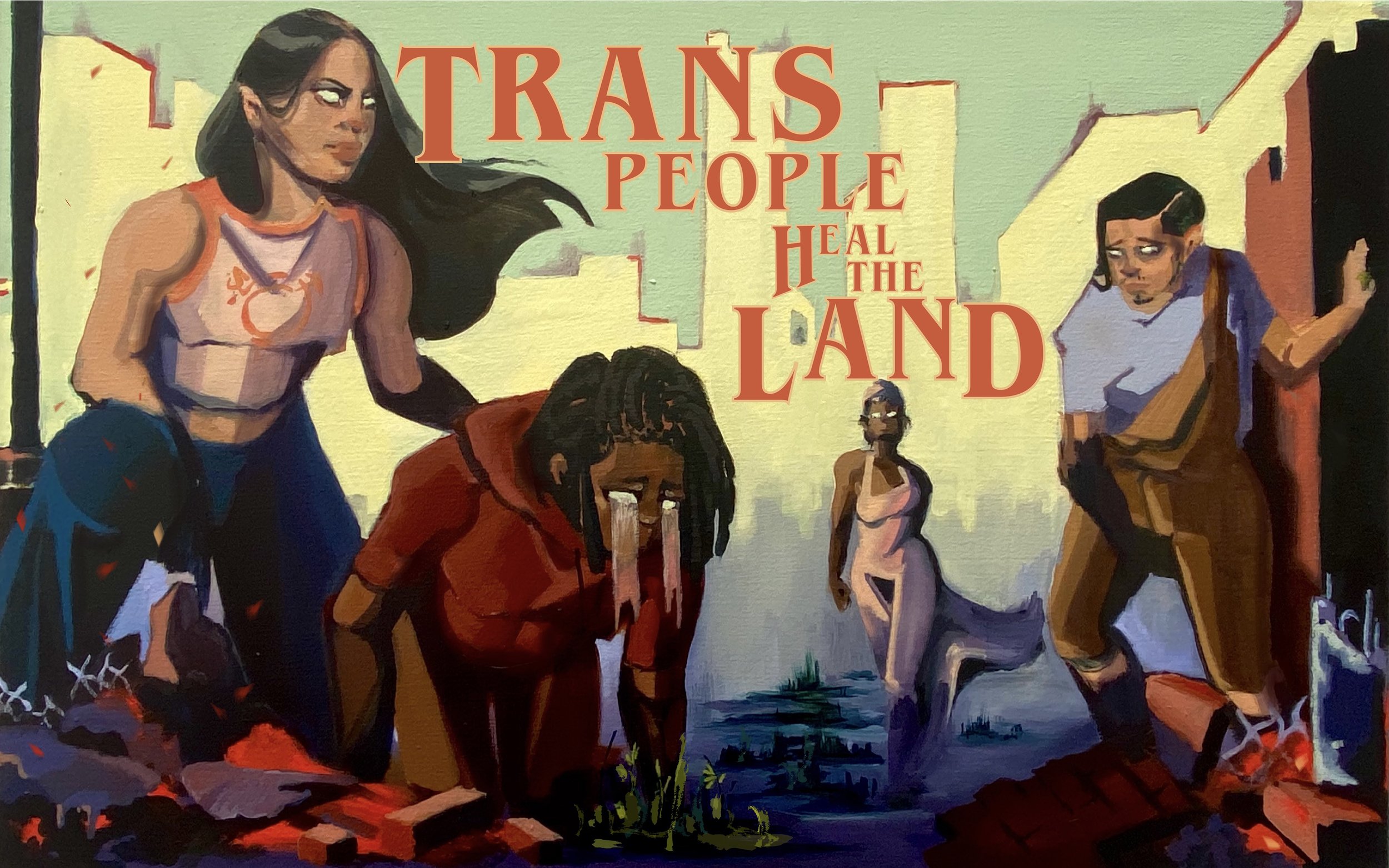Episode 3: “Trans People Heal The Land” by Ava J. Tuitt
Transcription:
I do think that it is so important to make sure that people are fed. And I think that that is true visually, I think that is true materially, I think that people fighting from a place of hunger and desperation is not only cruel and unfair but it is, um, white supremacist and capitalist. [MUSIC]
My name is Ava Jean Tuitt. My pronouns are she/her/hers. I currently live in Brooklyn, New York which I believe is Lenape Land. I am a painter and digital illustrator.
I think the major themes of my work are definitely self-actualization, interconnected healing and community, embodiment, joy, Black culture and the ways in which, um, our bodies respond to nature and society. I center those in my work by constantly striving to, I think, humanize political stances. I try to show figures that are just as sad as they are triumphant, I try to show them just as tired as they are motivated and I think in hopes that when people see that they relate that any struggle, whether it's for like body autonomy or, you know, voting rights, or climate justice, it is all deeply personal fights.
“Trans People Heal The Land” was created as a part of the Trans Day of Resilience. Visually I really wanted to create something that represented where I was. We were suffering at all of these intersections of our government failing us in terms of a pandemic response. So many people were literally dying, but simultaneously there were wildfires in California and multiple states in the United States that didn't have clean drinking water, while also being a year for a record amount of gender justice inequalities and legislations being passed that restricted trans people's rights and I wanted to make something that held all of that. Held how scary and overwhelming it was and really create a piece that left room for mourning because I think so many of us were in mourning and I don't think we knew how to vocalize it and we didn't know how to get out of this idea of fixing the entire world. And so I wanted to make something that showed that taking that moment to kind of unravel, um, can be an extremely pivotal point that pushes you further into that moment of triumphance, and so I was like, these are deeply connected things. Like if we want to have any hope— in my mind— have any hope of actually tackling all these issues, we always have to be deeply in touch with like where we are emotionally and how capable we are mentally, and being honest about that and understanding that that isn't a weakness or a shortcoming. It's to be expected.
Climate justice is deeply connected to how we as a society deal with not only mental health, but how we understand white supremacy’s impact on our planet. In “Trans People Heal The Land'' specifically I am making visual cues to, yes wildfires that are happening globally but also this kind of infrastructural issue within cities because I think there’s a more human future if we invest in it.
All of the work I've made in the past 3 years has been focused on uplifting and centering, specifically Black trans femme bodies, brown trans femme bodies, trans masc bodies as well. Like I am making us the most defiant, shiny, colorful, powerful, yet vulnerable figures that I can muster in the hopes that the thing that happens when you see yourself reflected and actualized, is that hopefully you feel incentivized or empowered to know that you can embody that as well. And I do that for myself, I do that to myself too not only because I'm painting bodies that reflect my own and people that I care about, but because I'm also very literally inserting myself into these paintings because I know that it works for me. I know that seeing myself, seeing my body, seeing my thoughts, seeing my feelings validated in the visual medium helps me. And so the hope is that in doing that for other bodies, doing that for other people, they will be helped as well.
I think that older trans people have such a radical view of gender, and I think sometimes we forget how much power and wisdom they hold, and also just how much they’ve done for us. But then simultaneously, I'm also pulling a lot from the wisdom that my mother gave me, that my grandmother gave me, that her grandmother gave her, which is this deep investment in community and honestly just like kindness. My grandmother was very involved in her community, very involved in her church, very involved in feeding people and helping people and my mother is the same. And I hope that I am carrying that forward. A seasoned sexy trans feminine person— Ms. The Honorable Cecilia Gentili— when I graduated from college told me to always be gentle with myself and I think that that's really been the gift that I've been giving to people since.
I'm a pleasure politics person. I think that’s like maybe an oversimplification, but I do think that it is so important to make sure that people are fed. I hope my work feeds people, literally and otherwise. Like I’m always hoping that these things turn into something physical for someone. That even if it’s just a visual reminder, like that is the power of art. Art is pleasure politics. Art is giving people an imagination. [MUSIC]
MUSIC & SOUNDS USED:
Theme music : Water Fluid - Music by ItsWatR from Pixabay
Tranquilness ambient healing music meditation yoga zen - Music by HarumachiMusic from Pixabay
Wind Chimes Bells - Sound Effect by SoundsForYou from Pixabay


